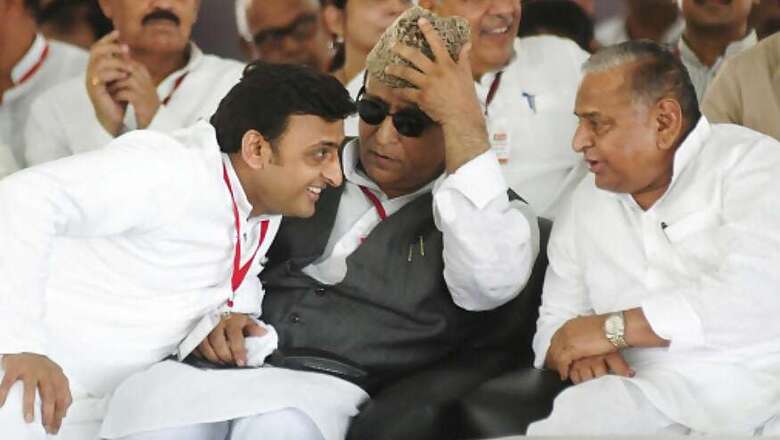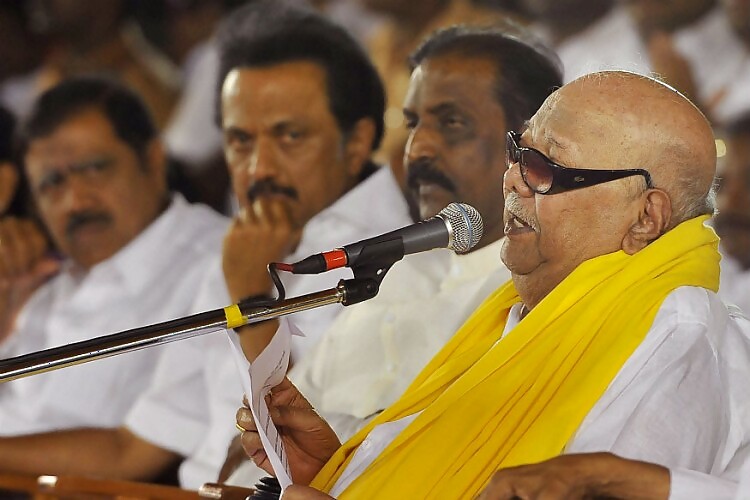
views
The SP drama may have created more confusion than a clear line of command. Maybe Netaji can look southwards for some lessons on how to manage differing aspirations"All happy families are alike; each unhappy family is unhappy in its own way."
― Leo Tolstoy
AS it turns out, after three days of high drama and a lot of heartburn, Samajwadi Party patriarch Mulayam Singh Yadav has finally managed to, well, restore the status-quo.
The fight that erupted between his son-chief minister Akhilesh Yadav and brother and Uttar Pradesh SP unit Shivpal Singh Yadav has ended with Akhilesh remaining as CM and Shivpal remaining as party state chief with his cabinet portfolios restored.
We may not have yet seen the denouement of this Yadav power-play but Netaji – as Mulayam is known outside of his household – may well have shot himself in the foot with his mismanagement of family affairs that brought out the dirty linen into Lucknow streets.
Shivpal himself has a lot to worry as he saw cousin Ram Gopal Yadav team up with veterans like Naresh Aggarwal to snub him. So with just a few months to go before the all-crucial state assembly polls, Netaji & Co have a party that’s been deeply divided.
Succession-planning in political dynasties is never an easy task. The pragmatic route is to manage aspirations and keep palace coups in check. Ask a certain 92-year-old veteran of dynasty politics, Muthuvel Karunanidhi a.k.a the Kalaignar (artist), the maestro of aspiration management.
The five-time Tamil Nadu chief minister may be confined to his wheel-chair but he has been able to maintain a delicate yet long-standing balance of power in a family where two sons, a daughter and two grand-nephews have been waiting in the wings for decades.

Cut to early 2005, this correspondent had the opportunity to personally observe a conversation between Mulayam, and a socialist leading light from Karnataka, the late S Bangarappa,
The former Karnataka chief minister had just defected from BJP to Samajwadi Party. It was an audacious move. He had won the 2004 Lok Sabha polls on a BJP ticket after defecting from the Congress a month before elections. And as the ruling BJP-led NDA lost in the General Elections, Bangarappa got increasingly dejected and had decided to go back to his roots – the Lohia pariwar where he had started his politics in 1967.
After joining the party at SP’s office in New Delhi’s Copernicus lane, Bangarappa invited Mulayam to his house for a Karnataka lunch. Yadav happily accepted the offer, and both drove off to his residence in Bangarappa's car. This reporter was sitting in the front seat (to interview Bangarappa). During their short trip through Lutyen’s Delhi, the two of them discussed their long political journey, their ups and downs, common friends and foes et al.
Bangarappa replied: "Mulayamji, when you and I were just first-time MLAs, Karunanidhi was already the Tamil Nadu CM. He is from a different era and a real stalwart in Indian politics. I understand your problem."
Bangarappa was telling Mulayam that Karunanidhi was the real Netaji. Mulayam didn’t reply, he seemed lost in thought.
The shadow of Karunanidhi has crossed Mulayam’s path many times. After early 1990s, the political analysts started comparing DMK with SP describing SP as DMK of UP. And no one could ignore the similarity that both were pitted against – and ate humble pie at the hands of – two self-made iron ladies of Indian politics, J Jayalalithaa and Mayawati.
Till 1990s the DMK was primarily a party of several likeminded leaders with no family influence or interference. Same was the case with Mulayam-led Janata Dal and later the SP. Karunanidhi had his nephew the late Murasoli Maran in New Delhi as his point person. Both his sons MK Stalin and MK Azhagiri were still learning the ropes and had not yet taken control of the party.
During his fifth term as TN chief minister between 2006 and 2011, Karunanidhi made the line of succession official by making Stalin deputy chief minister under him. It had mightily upset his elder son Azhagiri who was a Union minister at that time. In the Azhagiri Vs Stalin battle for supremacy in the party their cousins Maran brothers became collateral damage. Dayanidhi Maran even lost his Cabinet berth at the Centre.
During the same period Karunanidhi’s daughter MK Kanimozhi also entered politics taking Rajya Sabha route. It vitiated the atmosphere further at MK household raising doubts over his ability to rein in feuding members of the clan. Several political observers felt that raging fire in the family might consume the entire DMK.
AR Venkatachalapathy, Professor at Madras Institute of Development Studies, feels that what Karunanidhi could do and Mulayam couldn’t is also because of the fact that the former has no national ambitions.
"Mulayam made son Akhilesh the CM keeping an eye on national politics. But Karunanidhi has had no such ambitions,” he says, adding that SP and DMK have little in common if you look further.
"When compared to SP, the DMK looks like a paradise. It is not just Karunanidhi’s family party. They are different parties. DMK is much older and stronger. It has a long history. It has a solid party structure and many other leaders. The SP is primarily a Mulayam Singh Yadav party. It is full of his family members. Karunanidhi did not make MK Stalin the CM," he said.
Venkatachalapathy has but one bit of advice for both the DMK patriarch and the Samajwadi stalwart: “Perpetuating family rule is a double-edged sword. It will cut both ways".
In fact, as the SP drama started playing out in TV screens early this week, there were many in New Delhi who felt this could be Akhilesh’s 'Indira Gandhi moment'. That the young CM had finally come of age and is about to show his "chachas" what he is made of. Well, the jury is out on that one, but one of the men who remembers the heady days of the 'Syndicate' in Delhi believes the comparison is right although the outcome is muddy.
"In 1969 the relatively younger Indira Gandhi (she was 52 years old), and much younger supporters of hers, revolted against the Congress party led by my father-in-law. Initially, he and his friends looked much stronger. They even dismissed the PM Gandhi from the party. But finally what happened? She emerged stronger and became the undisputed leader," Rajashekharan recalls.
"I agree that UP situation is similar to that. But I don’t know if Akhilesh would be able to achieve what Indira achieved. Had Nehru been alive Indira would not have been able to do that. Is not Mulayam Singh Yadav still the leader of SP? One thing is right. Akhilesh is also ambitious like Indira Gandhi and wants to emerge as a leader on his own. But SP is not Congress," he says.
Well, neither is it DMK.




















Comments
0 comment